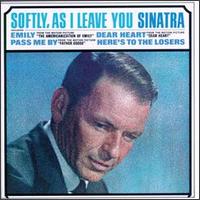
Softly, as I Leave You is a 1964 studio album by American singer Frank Sinatra. Arranged by Ernie Freeman, several tracks such as "Softly, as I Leave You", "Then Suddenly Love" and "Available" departed from Sinatra's signature vocal jazz style by flirting with a more contemporary pop sound. The rest of the album is pieced together with leftovers from various early-'60s sessions, from many different arrangers and conductors.

L.A. Is My Lady is the 57th and final solo studio album by American singer Frank Sinatra, released in 1984 and produced by Quincy Jones. While the album was Sinatra's last, he recorded five further songs, only four of which have been officially released.

"The Pink Panther Theme" is a jazz composition by Henry Mancini written as the theme for the 1963 film The Pink Panther and subsequently nominated for the Academy Award for Best Original Score at the 37th Academy Awards but lost to the Sherman Brothers for Mary Poppins. The eponymous cartoon character created for the film's opening credits by David DePatie and Friz Freleng was animated in time to the tune. The tenor saxophone solo was played by Plas Johnson.

Blues Cross Country is a 1962 studio album by Peggy Lee, principally arranged by Quincy Jones, with some arrangements by Benny Carter. The album can be described as a concept album, consisting of a musical journey across the United States through swinging blues songs, many of which were written by Lee with other contributors.

Texas Thunder Soul 1968–1974 is a two-disc compilation album of recordings by the Kashmere Stage Band, released on Now-Again Records in 2006. The first disc contains studio recordings by the group, including energetic cover versions of "Theme from Shaft", "Super Bad", "Scorpio" and "Burning Spear". The second disc features unreleased live recordings and alternate takes, and includes a 12-minute video documentary about the group, Texas Jewels. The album includes a 40-page booklet filled with photos, interviews and ephemera.

Our Shining Hour is a 1965 studio album by Sammy Davis Jr., accompanied by the Count Basie Orchestra, arranged by Quincy Jones.

Miles & Quincy: Live at Montreux is a collaborative live album by American jazz trumpeter Miles Davis and conductor Quincy Jones. It was recorded at the 1991 Montreux Jazz Festival and released by Warner Bros. Records in 1993.

Smackwater Jack is a 1971 studio album by Quincy Jones. Tracks include the theme music to Ironside and The Bill Cosby Show.

Frank Sinatra's Greatest Hits! is the first compilation by American singer Frank Sinatra released on his own Reprise Records. It concentrates on mostly single releases from the mid to late 1960s, which fluctuates between adult contemporary pop and jazzy swing. The album opens up with Sinatra's recent number one hit "Strangers in the Night" and continues through the varied styles of music Sinatra recorded in the 60s, from easy listening ballads like "It Was a Very Good Year" and "Softly, as I Leave You" to contemporary pop like "When Somebody Loves You" and "That's Life". Greatest Hits was a modest hit, peaking at #55 on the album charts in late 1968. A second volume was issued in 1972, Frank Sinatra's Greatest Hits, Vol. 2. Both albums have since been supplanted with newer and more cohesive compilations.

Ellington '66 is an album by American pianist, composer, and bandleader Duke Ellington that was recorded and released on the Reprise label in 1965. The album won a Grammy Award for Best Instrumental Jazz Performance – Large Group or Soloist with Large Group.

Super Hits is a greatest hits album from Miles Davis. Released in 2001, it reached #22 on Billboard's Jazz Albums chart.
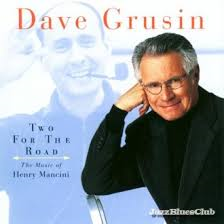
Two for the Road is an album by American pianist Dave Grusin, of the music of Henry Mancini. It was released in 1997, recorded for GRP Records, and reached No. 1 on Billboard's Jazz chart.
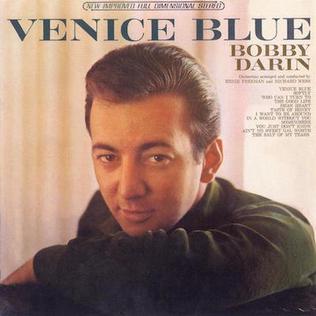
Venice Blue is an album by American singer Bobby Darin, released in 1965. It peaked at 132 on the Billboard charts.
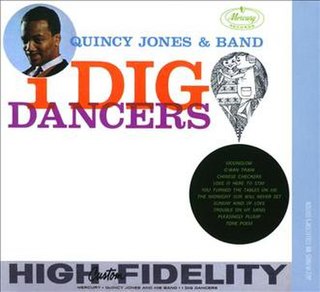
I Dig Dancers is an album Quincy Jones that was released by Mercury with performances recorded in Paris and New York City.

This Time by Basie is an album released by pianist, composer and bandleader Count Basie featuring jazz versions of contemporary hits recorded in 1963 and originally released on the Reprise label.
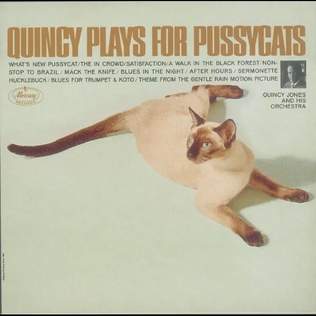
Quincy Plays for Pussycats is an album by Quincy Jones featuring sessions recorded between 1959 and 1965 which was released on the Mercury label.
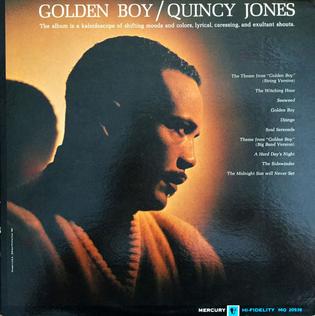
Golden Boy is an album by Quincy Jones which was released by Mercury in 1964. The album includes three versions of the theme from the musical Golden Boy with three original compositions and jazz versions of pop hits.

Our Man in Hollywood is a 1963 album by American composer and arranger Henry Mancini.


















